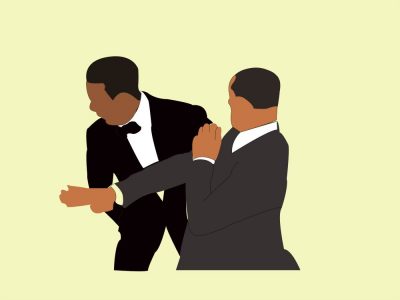When I heard the slap that rang around the world, my first move was to blast every suspected interested person in my life’s phone with the news. Then, with frenzied curiosity, I searched for more details on the incident. My temper was cooled by a victim of my contact who could see past the simple facts of the sight — a friend who raised the possibility of it having been staged.
All the world’s a stage, and highly marketable entertainers are its clear players.
Cinema’s slow death is accelerated by the growing discord between popular, blockbuster targeted audiences and highbrow, arthouse targeted ones. Take ABC’s threat to take the historical ceremony off the air unless the Academy agreed not to televise the more “niche” awards, or regard the attempted instantiation of the “Popular Film” category in 2019.
The Academy Awards is the main, landlocked battleground for these powers to call to arms — and, with neither side winning or losing, the war for film is as lost as its cause. Us Zoomers are investigating new territories of entertainment, where conventionally dueling realms of entertainment and art will not disagree, truncating the Oscars’ viewership.
Still, blockbuster entertainers, like Will Smith and Chris Rock, do not lose their art. After Rock landed an insensitive joke targeting Smith’s wife, Jada Pinkett-Smith, Smith lost his jiggy with him. Smith took to the stage to smack Rock with an open hand. A thump was heard and a face was marked. Through a searing scowl and teeth bared by a twitching lip, the famously unswearing Smith shouted expletives at Rock.
By dominating social media trends and making news cycle headlines, both entertainers onstage successfully entertained audiences. But I think that my friend was among many audience members who asked if Smith and Rock’s entertainment required artifice — if the slap was real.
The question itself may be more real than its answer.
In mid-20th century America, the purveyance of information regarding current events was conventionally delegated to the news. The democratization of television sets in the 1970s meant that protests over the truthfulness of news were unusual or subject to scrutiny.
However, the oversaturation of cable news cycles by the 1980’s was dizzying. Only when the 2016 elected Trump administration swept our country away did distrust toward news narratives fully conventionalize — former President Donald Trump spearheaded the “fake news” movement among conservatives, and left-wing commentators were vanguards to the discourse of “post-truth politics” among liberals. Both powers decried the other’s communications as not information, but misinformation — or worse, as disinformation (distinguished from general misinformation by its intent to misinform).
Others criticized the made-for-television theatrics of politicians exploited by the 24-hour news cycle. They alleged the omission of valuable information to be supplanted by information capable of fulfilling a dual role — informing and entertaining.

With neither side winning or losing, the war for information is as lost as its cause. What survives the bloodshed is an attitude of skepticism.
While the war for information is skepticism’s most blatant revelation, it is not necessarily its premier cause.
Human identity is partially determined by difference from other embodiments of life—plants and animals—through the symbiosis of cognitive prowess with tool making. Humanity saw the earth as an anarchic stage, of which human survival depended on their directing of nature’s props. Their director’s vision succeeded — humanity controlled the environment with an unprecedented artistry, branding every plant and animal with their signature written in iron, bronze, and all uncovered stones, leaving only themselves unsigned.
The ancestors of our creative character today drew the curtain on the hard work of survival to encourage survival by easy play. In consequence, we were left only to survive each other, and left only to sign ourselves.
After the surge of screen-based play and spectacle, we directed ourselves into (the) play’s clearest sign — the actor, whose successful entertainment is motivated by the pretense and restraint of their psyche to affect the behavior of a scripted character. In fighting to entertain, we do not live to act but act to live. It makes sense to project that those most sensational and high-achieving never exit to the green room for a break from what is staged.
The anticipation of a conversant we are sharing brief chit-chat with to misinform compels concentrated investigation. We map timelines of the details they referenced to reveal discrepancies and align their jargon with the style of other groups to reveal hidden loyalties. If they smile, we check if their eyes smile with them. If they slap someone, we perk our ears for the “whack!”
Disoriented by the unreality of infotainment and scratching skins irritated from costumed disguises, we open a plurality of investigations and end up solving more problems. Suspicion benefits our cognition.
Past humankind directed so we could play and we are players so we can direct, while yet a new position emerges. I notice skeptical people reviewing the role of the Academy’s financial threat, the slapper’s domestic tension or boredom sparked from excessive idle play, in writing the slap’s script. They retire the characters they play by breaking the fourth wall of their own fiction, and choose to or not to suspend their disbelief at reality’s dramas. Entering now are the critics, who disconnect to create connection, and distrust to build faith.
Be skeptical of the spectacle.
























































































































